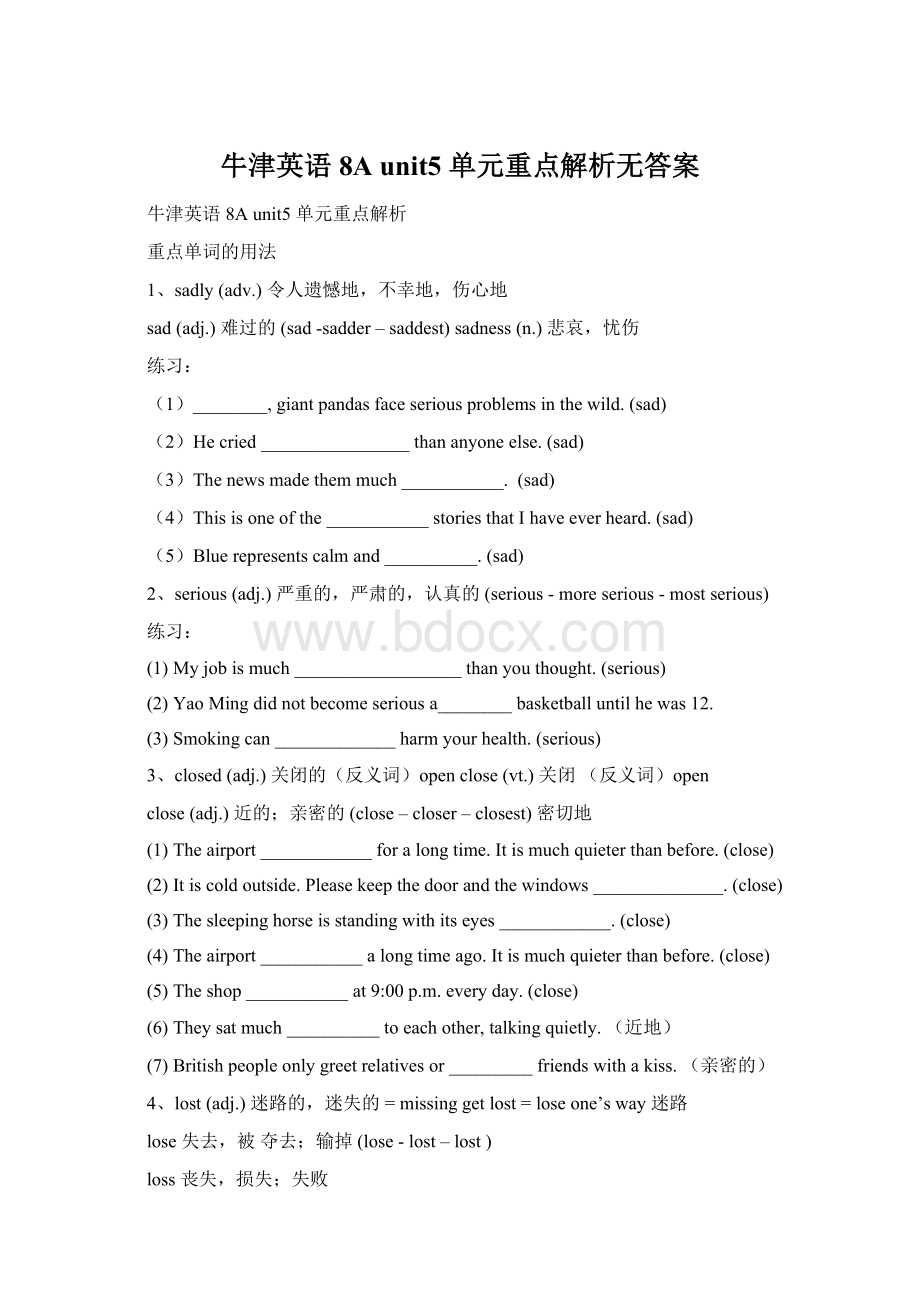牛津英语8A unit5 单元重点解析无答案.docx
《牛津英语8A unit5 单元重点解析无答案.docx》由会员分享,可在线阅读,更多相关《牛津英语8A unit5 单元重点解析无答案.docx(12页珍藏版)》请在冰豆网上搜索。

牛津英语8Aunit5单元重点解析无答案
牛津英语8Aunit5单元重点解析
重点单词的用法
1、sadly(adv.)令人遗憾地,不幸地,伤心地
sad(adj.)难过的(sad-sadder–saddest)sadness(n.)悲哀,忧伤
练习:
(1)________,giantpandasfaceseriousproblemsinthewild.(sad)
(2)Hecried________________thananyoneelse.(sad)
(3)Thenewsmadethemmuch___________.(sad)
(4)Thisisoneofthe___________storiesthatIhaveeverheard.(sad)
(5)Bluerepresentscalmand__________.(sad)
2、serious(adj.)严重的,严肃的,认真的(serious-moreserious-mostserious)
练习:
(1)Myjobismuch__________________thanyouthought.(serious)
(2)YaoMingdidnotbecomeseriousa________basketballuntilhewas12.
(3)Smokingcan_____________harmyourhealth.(serious)
3、closed(adj.)关闭的(反义词)openclose(vt.)关闭(反义词)open
close(adj.)近的;亲密的(close–closer–closest)密切地
(1)Theairport____________foralongtime.Itismuchquieterthanbefore.(close)
(2)Itiscoldoutside.Pleasekeepthedoorandthewindows______________.(close)
(3)Thesleepinghorseisstandingwithitseyes____________.(close)
(4)Theairport___________alongtimeago.Itismuchquieterthanbefore.(close)
(5)Theshop___________at9:
00p.m.everyday.(close)
(6)Theysatmuch__________toeachother,talkingquietly.(近地)
(7)Britishpeopleonlygreetrelativesor_________friendswithakiss.(亲密的)
4、lost(adj.)迷路的,迷失的=missinggetlost=loseone’sway迷路
lose失去,被夺去;输掉(lose-lost–lost)
loss丧失,损失;失败
(1)Unlessyouhaveamap,youwillget______easily.(lose)
(2)Thepolicearesearchingthemountainforthe______child.(lose)
(3)ManyoftheChinesepaintings_______________inthepastfewyears.(lose)
(4)Manywildanimalsareafraidof_______theirlivingareas.(lose)
(5)Wolvesareworriedaboutthe________oftheirlivingareas.(lose)
(6)Whenshediedin1993,theworldfeltsadaboutthe__________ofagreatbeauty,agreatactressandagreathumanitarian.(lose)
5、while(n.)一会儿,一段时间(conj.)然而(conj.)当……的时候,和……同时
1a面加持续性的动词②whiledoingsth.
(1)Aftera__________,wesawAmyrunningtowardsus.(一会儿)
(2)Tigerscanrunveryfast,butonlyforashort__________.(一段时间)
(3)ManybirdsliveinZhalongallyearround,______somegothereonlyforashortstay.
A.whenB.whileC.soD.because
(4)IhaveaskedmyrobottolookafteryouwhileI____________(leave).
6、living(n.)生存,生计livingareas
alive(adj.)活着的stayalive活着(作表语)
lively(adj.)活泼的;生气勃勃的(lively-livelier-liveliest)
live(adv.)在现场直播,在实况直播becoveredlive
live(v)生活
7.dievi.死现在分词dying过去式、过去分词died
deathn.死亡deadadj.死的
dieof...死于...(疾病,年老,劳累等内部原因)
diefrom...死于...(事故,地震,饥饿等外部原因)
提醒:
die是不延续性动词,不能和表示一段时间的时间状语连用。
havebeendead+for+时间段=died+时间段+ago
eg.Hisfatherdiedtenyearsago.
Hisfather'sdeathmakeshimfeelsad.
Hisfatherwasdead.
Thedoctorsavedadyingboy.
a)The_________oldmanishisenemy.He________twodaysago.
A.died;diedBdead;deadC.died;deadD.dead;died
b)Thedoctor________a_________yesterday.
A.saved;dyingBsaved;deadC.safe;deadD.safe;dying
c)WangWei,theyoungpilot,___(die)forourcountry.Hewillliveinourheartsforever.
d)Hurry,doctor!
It'samatteroflifeand_______(die).
练习:
(1)Nooneknowswhathedoesfora_____________.(live)
(2)Our__________conditionshavechangedalotovertheyears.(live)
(3)Ifwedonotacttoimprovetheenvironment,more__thingswillbekilledbypollution.(live)
(4)OurEnglishteacherusedifferentactivitiestokeepourclass________andinteresting.(live)
(5)SunshineTVwillcoverthisyear’sBeijingMusicAwards____thisSaturday.
7、sell(vt.&vi.)卖,出售(sell-sold–sold)
sellwell畅销(不能用被动语态)
sellwell畅销(不能用被动语态)
sellout卖光(可以用被动语态)
练习:
(1)Thiskindofmooncakesistasty.It______wellanditisnowsoldout.
(2)Thecakeslook________,sotheysell________.
A.good;goodB.well;wellC.good;wellD.well;good
8、act(vi.&vt.)行动;表演act---actor男演员---actress女演员action(n.)行动;行为
active(adj.)积极的,活跃的;主动的(反义)inactive
activity(n.)活动(pl.)activities
练习:
(1)Ithinkeverybodyshould____________toprotectwildanimals.(行动)
(2)JackieChenisoneofthebestknown___________intheworld.(act)
(3)In1951,while_________inFrance,HepburnmettheFrenchwriterColette.(act)
(4)JackieChen’sfilmsjoinhumourandexciting__________(act)together.
(5)Mostbirdsarea________inthedaytime,soyoucaneasilywatchthemthere.
(6)Iusuallydoafter-schoola____________at4:
00p.m.onweekdays.
(7)Someofthe___________aregoingtobeheldinthetownsquare.(activity)
10.meanvt.意思是,意味着过去式meant
→meaningn.意义,意思
→meaningfuladj.有意义的
→meaninglessadj.无意义的
●mean意为“意思是...”时,后接that引导的宾语从句。
Theteachermeantthatyoumustlistencarefully.
●mean意为“意味着...”时,后接动名词(v-ing)作宾语。
Whathesaidmeanssendingyoutothehospital.
●mean还可以译为“打算,意图”,后接动词不定式(todo)做宾语。
Idon’tmeantohurtyou.
a)Whatdoestheword"ordinary"meaninChinese?
A.勤劳的B.聪慧的C.普通的D.坚强的
b)Whatdoestheword“wild”m_______inthistext?
c)Ididn’tknowhowmuchthematch_____(意味)toyou.
d)Thelittlegirlreadthestory,butshedidn'tknowits(意思).
后缀ing,ness,ion将动词或形容词变成名词
1、v.+-ing→n.
mean—meaningfeel—feelingmeet—meetinghunt—hunting
begin—beginningshop—shoppingpaint—paintingread—reading
2、adj.+ness→n.
ill—illnesskind—kindnesssick—sicknessdark—darkness
sad—sadnesshappy—happinessblind—blindnessfit—fitness
great—greatnessugly—uglinessbusy—businesscareless—carelessness
3、v.+ion→n.
act—actiondiscuss—discussioncollect—collectioncelebrate—celebration
invite—invitationdecide—decisionprotect—protectioninvent—invention
attract—attractiondonate—donationintroduce—introductionoperate—operation
educate—educationpollute—pollutionproduce—productionorganize—organization
examine—examinationprepare—preparation
4、v.+ment→n.
move—movementdevelop—developmentadvertise—advertisementtreat—treatment
5、其他
fly—flightdie—death
重点句型和短语解析
1.wild不可数名词“自然坏境,野生状态”inthewild在野外,处于野生状态
adj.“野生的”wildanimals野生动物
a)Ifanimalsstayinthe_______(野外),theywillbefree.
b)-Idon'tthinktheanimalsshouldbekeptinthezoo.-Butiftheyliveinthe_______,wehavenochancetoseethem.
c)Whatdoestheword“wild”m_______inthistext?
d)Choosethewordwhoseunderlinedpart'spronunciationisdifferentfromtheothers'.
A.wildB.dishC.thickD.kill
2.--Socouldyoupleasenoteatthem?
--Noway!
[Could/Wouldyouplease(not)dosth?
]一种表示请求的巨型,语气比较委婉、客气。
肯定回答:
Sure./Ofcourse./Noproblem.
否定回答:
Sorry,butI....
[noway]“不可能”常用在口语中,表示不同意或拒绝。
还可以表示不相信或惊讶“不会吧”
a)-Couldyoupleasedrivemore_______?
It'stoofast.-OK.Iwill
b)Couldyouplease_________mesomebread?
I’mhungry.
A.getB.togetC.gettingD.got
3.pity不可数名词“同情,怜悯”have/takepityon...同情....
可数名词“可惜,遗憾”常用单数形式whatapity!
真可惜!
a)Weshouldhaveonthehomelesspeopleandtryourbesttohelpthem.
A.shameB.pityC.reportD.danger
b)It'sa(遗憾)foryoutohavetostayathomeinsuchafineday.
4.WecalledherXiWang.我们叫她希望。
①callsb.…意思是:
叫某人……,称呼某人……
结构是:
call+宾语+宾语补足语
②被动语态形式becalled意思是:
被叫做……,名为……
③called可以放在名词后面作定语,意思是:
叫……(名字)的人、物或地方
3.inthebeginning的含义:
开始,开端,起初。
请同学们注意区分与beginning相关的结构
atthebeginning(of)
其常常跟of短语连用(如:
oftheweek,oftheyear,ofthebook等),如果后面没有跟of短语,则大都可以从上下文看出来。
应当注意,atthebeginning在单独使用时,有时与inthebeginning同义。
如:
Hedislikeditat(in)thebeginning.
inthebeginning
通常单独用作时间状语或定语,而较少跟of连用,其意义为:
起初,在开始的时候,相当于atfirst,暗含着后来有变化的意思
请同学们了解相关的固定表达形式:
Abadbeginningmakesabadending.[谚]不善始者不善终。
from(the)beginningto(the)end=fromfirsttolast从头到尾,自始自终
5
.
not...anymore
=nomore
数量和程度上的
“不再”
常修饰短暂性动词,指某个动作不再重复发生,它所表达的是“neveragain”或“没有更多”
not...anylonger
=nolonger
时间或距离上的
“不再”
它一般修饰延续性动词,表示某个动作或状态不再延续下去现在的情况和过去的情况加以比较,所以多用于一般现在时
nomore和nolonger放在行为动词的前面
not...anymore和not...anylonger放在助动词和be动词的后面
a)Iwillnomorebuyanimalfur.(同义句转换)
Iwill________buyanimalfur__________________.
6.learntodosth学会做某事→learnt/learned
learnbyoneself自学
learnof/about了解关于...
learnfrom...向...学习
learnbyheart背下来,背熟
a)Weshouldl______fromheroes.
b)Weshouldlearn___________(look)aftertheflowersinourgardenswell.
7.Asaresult,pandasmaynothaveaplacetoliveorfoodtoeat.
asaresult因此
asaresultof...由于,因为;作为....的结果
a)Youwillgetagood_____(结果)ifyoutryyourbest
b)HespentalotoftimeonEnglish.,hegotthemostpointsintheEnglishtest.
A.InfactB.OtherwiseC.AsaresultD.However
c)Simonworkshard,soheoftengetsgoodintheexams.
d)Thecouplehaddifferentideasaboutthematter.__,theydidn’tmakeadecision.
A.InsteadofB.AsaresultC.BecauseofD.Bytheway
8.indanger处境危险outofdanger脱险
[类似]introubleinneed
safe--safely--insafety
danger--dangerous--dangerously
a)Whatshouldyoudowhenyouseesomepeople_______?
A.inda
ngerousB.indangerC.dangerousD.dangerously
b)Therearemany________(danger)animalsintheforest.
c)Isthere______inclimbingthattree?
ADangerB.somedangerC.anydangerD.anydangers
d)Themanonthehorsewasin________justnow,butnowheis________.
A.dangerous;safeB.
dangerous;safelyC.danger;safelyD.danger;safe
e)Hewasbadlyilllastwinter,butnowheis_______.
A.indangerB.intodangerC.outfromdangerD.outofdanger
f)KangaroosarenowinAustralia,sotheyshouldtakeactionprotectthem.
A.indanger;justnowB.dangerous;rightnow
C.indanger;rightawayD.dangerous;rightthen
9.takeaction采取行动takeactiontodosth采取行动做某事
a)—Iamgoingtostudyhardfromnowon.
—_______speaklouderthanwords.Youshoulddoitinsteadofsaying
b)Wha